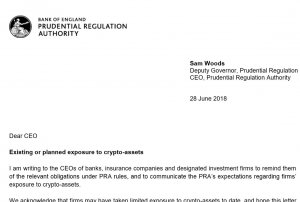FCA dear CEO letter on financial promotions
The Financial Conduct Authority (FCA) has published a second letter with regard to financial promotions.
This letter is written to all firms engaged in approving financial promotions of retail investments to underline how seriously the FCA treat this issue.
Following the letter earlier in January reminding all regulated firms of their responsibilities relating to the use of financial promotions, this letter reminds firms that before they approve a financial promotion for communication by an unauthorised person, they must confirm that it complies with our rules on financial promotions. This includes ensuring that the financial promotions which they approve are fair, clear and not misleading.
Despite the first letter issued in January, the FCA has identified a number of examples where it appears the due diligence carried out on a financial promotion may have fallen well short of the standard they expect.
The FCA reminds firms that even when investment products are not regulated or are issued by companies that are not FCA-authorised, these firms should provide a ‘s21 approval’ of their promotion, the firms can expect the FCA to require them to demonstrate that it has carried out such due diligence to ensure that the promotion is fair, clear and not misleading.
The FCA reminds firms that direct offer financial promotion of mini-bonds and other unlisted securities to retail clients is generally restricted to high net worth investors, sophisticated investors or “restricted investors” (who have certified that they are not investing more than 10% of their net assets in non-readily realisable securities). It is the responsibility of the firm that communicates or approves the direct offer financial promotion to ensure that this restriction and the rules on appropriateness of the investment are complied with.
The FCA also reminds firms that:
- before a firm approves a financial promotion for communication by an unauthorised person, it must confirm that the promotion complies with the financial promotion rules (COBS 4.10.2R(1));
- if at any time they become aware that the financial promotion no longer complies with the rules, it must withdraw its approval (COBS 4.10.2R(2));
- a firm that communicates or approves a financial promotion must have put in place adequate systems and controls, or policies and procedures, to comply with these rules (COBS 4.10.1G); and
- they must ensure that information presented is accurate and always gives a fair and prominent indication of any relevant risks when referencing any potential benefits (COBS 4.5.2R(2), COBS 4.5A.3EU).
The FCA warns that where they observe non-compliance with requirements by firms which approved promotions, they will take action. The FCA has a range of measures they can take which can result in the amendment or removal of financial promotions, the suspension or cancellation of planned issuance of these products to investors, formal limitations being placed on the activities of the firms which approved non-compliant promotion and civil or criminal proceedings.
Furthermore, where the FCA identifies concerns with the due diligence performed, firms can expect the regulator to examine what governance and oversight failures may have contributed to this and to assess who is responsible.
Further information:
To read more, please follow this link:
https://www.fca.org.uk/publication/correspondence/dear-ceo-letter-firms-approvals-financial-promotions-fcas-expectations.pdf
Contact us here
Other articles
Please Note: This publication is not intended to be a comprehensive review of all developments in the law and practice, or to cover all aspects of those referred to. Readers should take legal advice before applying the information contained in this publication to specific issues or transactions.

FCA dear CEO letter on financial promotions






